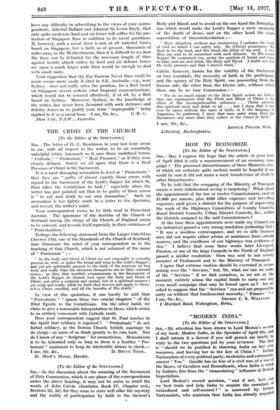[To the Editor of the SPECTATOR.] SIR, —In the discussion about
the meaning of the Sacrament of Holy Communion, which is one phase of the correspondence under the above heading, it may not be amiss to recall the words of John Calvin (Institutes, Book IV, Chapter xvii., Sections 34, 33), for they seem to state well alike the mystery and the reality of participation by faith in the Saviour's Body and Blood, and to avoid on the one hand the Zwinglian, ism which would make the Lord's Supper a mere memorial of the death of Jesus, and on the other band the crude superstition of transubstantiation :— " Here, therefore, without any controversy I embrace the truth of God on which I can safely rely. Ho [Christ] pronounces Yfig flesh to be the food, and His blood the drink of my soul. I offer Him my soul to be nourished with such aliment. In His sacred Supper He commands me, under the symbols of bread and wine, to take, and eat and drink, His Body and Blood. I doubt not that He truly presents and that I receive them."
Calvin, however, insists for the validity of the Sacrament on two essentials, the necessity of faith in the participant, and the agency of the Holy Spirit, one proceeding from the human side, the other from the Divine side, without which there can be no true Communion :— " We do no small injury to the Holy Spirit unless we believe that our communion with the Flesh and Blood of Christ is the effect of His incomprehensible influence. . . . Christ presents this spiritual meat and drink to all . . . but I deny that it can ever be eaten without the taste of faith, or if the language of Augustine be preferred, I deny that men carry away from the Sacrament any more than they collect in the vessel of faith."
I am, Sir, &e.,
Lilliesleaf, Roxburghshire.
ARTHUR POLLOK SYM.


























































 Previous page
Previous page